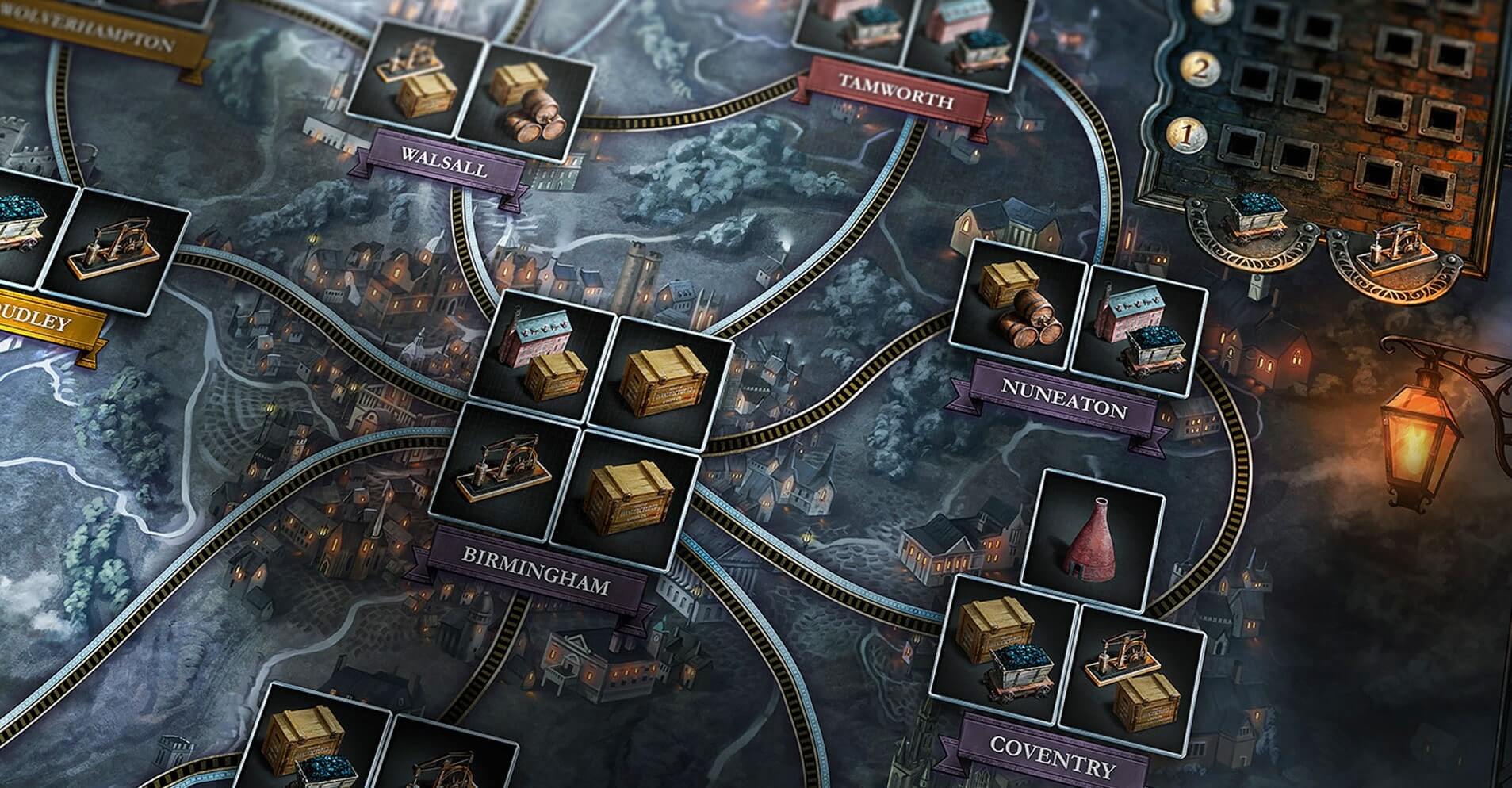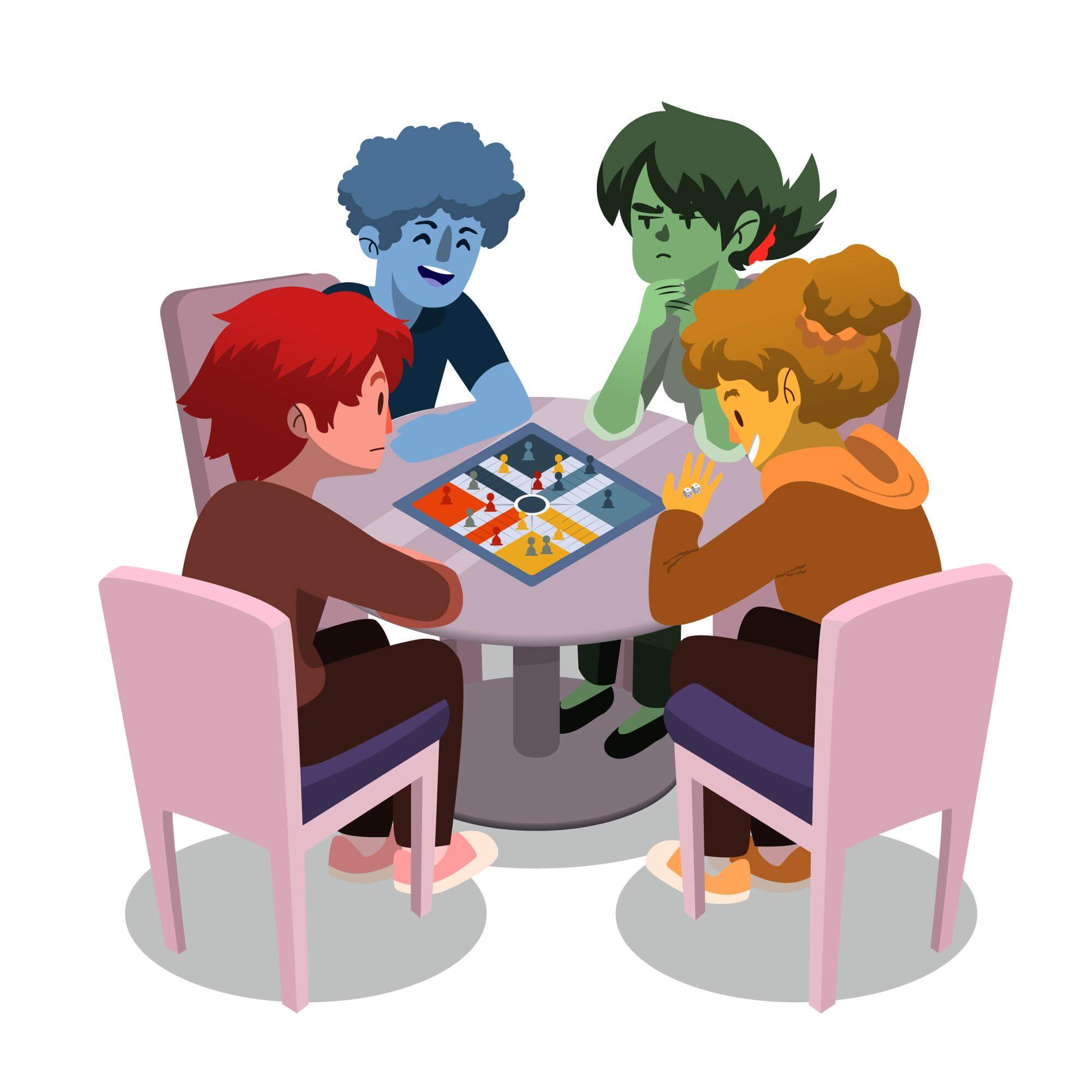The end of the second world war was a complicated time of history. Nations devastated by the horrors of a long-lasting international war, all struggled to find their way to move on and move forward. An era in history that brought about a massive wave of changes and alterations to almost all aspects of daily lives. Therefore, it is only natural to assume that one of the biggest changes to the world of tabletop entertainment was sparked somewhere around then. The rise of Eurogames.
You’d be absolutely right to assume that a post-war community were not exactly all over the combat and conflict games of the time, nor did they quite have the nerves to let dice decide their fate and so, a new genre of board games was invented that didn’t rely on neither one of those elements. Substituting the major elements of direct player conflict and luck from the main idea behind a board game, German game designers introduced a whole new fashion of abstract gaming in which competition took place in the form of overall comparison. Another major difference of this genre with the more traditional styles of games back then, was that it usually takes a lot less time to finish.
What this means is that Eurogames, alternatively known as Euro-style, German and German-style (German is a much older term in comparison to Eurogames) board games are those that focus mainly on individual development of strategy rather than head-to-head competition and real-time comparison. In simpler words, Eurogames provided a friendlier environment for the players to interact with each other and not actively try to jeopardize each other’s strategies the entire time. As opposed to the complexity in surface gameplay that was popular at the time, the innovation of Eurogames laid in the fact that they used abstract designs and themes to add depth to the strategy aspect of the gameplay rather than resource management or tactical combat.
Although games such as Chess and Go are believed to be the pioneers of all abstract games, Eurogames were the much needed upgrade on the idea. They brought the strategy of chess and similar games to the more accessible grounds of American-style boards. These games focus on giving players an equal amount of time to make the best decisions possible in order to have the most victory points by the end of the game with no players having advantages or disadvantages over one another. Meaning victory is achieved not by destroying your rivals, rather by doing an overall better job than they have throughout the entire game, which requires careful planning and cautious strategic decisions.
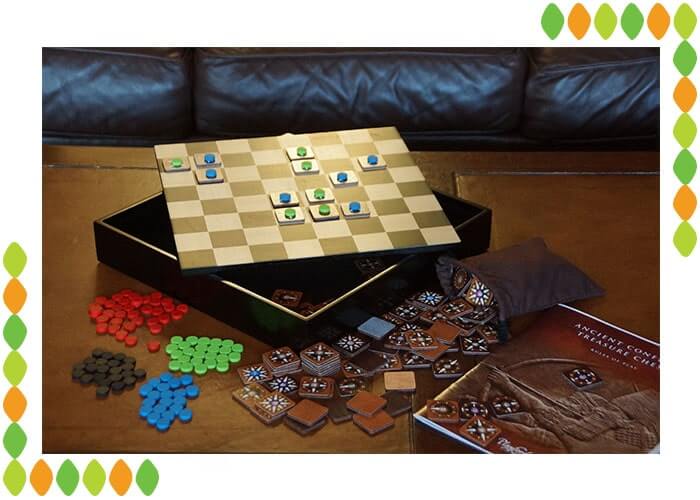
Older games all having played their part in bringing the genre popularity, it didn’t experience its first blow until the release of The Settlers of Catan, more recently known as Catan. Catan paved the way for many more Eurogames to come and it brought the newly established genre a whole lot of fame. One of significant reasons behind this was the fact that Eurogames proved to be superior when it came to social gaming experiences. The game is over when a limited resource runs out or a set number of rounds have passed, so unlike other genres, one session could not stretch further than 3 hours. This takes some competitive pressure off of the players and gives them the space and equality that’s needed to test out their strategic skills. Prior to this genre, most games involved going head-to-head against an opponent for gripping sessions that could take up to several hours with a constant need of luck all throughout the game.
The Euro-style formula involves using abstract designs to simplify enormous operations. This way the player may not have much to do on the game board except maybe moving figures around but is actually thinking about a lot of complicating key factors in their mind as they progress in the game. Not all the titles that fall within this genre are exactly heavy titles regarding their complexity, but the gameplay is usually layered and deep-structured, which guarantees a challenge for the brain for those who enjoy it. The principal of being easy to lay out and learn to play but difficult to master and win your games is another reason this genre excels at social events. New players will all begin on common grounds and require no additional knowledge of the game other than it’s basic rule set, which is usually quite simple, to start playing and they only rely on their own cognitive thinking abilities to play better than others.

Aside from depth of gameplay, abstract designs within the specific theme and being newcomer friendly, the genre is also the optimal genre of board games for couples and people who enjoy playing two-player games. Most of them, specially the more recent ones, also offer solo modes for people who’d rather challenge themselves individually and not against other players. Some titles release expansion packs for two-player or solo modes but a good number of them include both in the base game. If for one of the reasons mentioned above or any other reason, you’re interested in knowing more about Eurogames and the best titles of the genre, you should definitely stick around until the end of this article.
Best Eurogames to Play Right Now
If you’re sick of losing to dice or luck in general, or if you want to practice your strategy muscles, then your search is over because I have gathered a list of the best Euro-style board games out on the market right now. The genre is massive and so is its fanbase, however, these are the titles that have satisfied both my taste in board games and many other influencers and geeks have declared worthy of a close look. So, without further ado, let’s get into it.
7. Catan
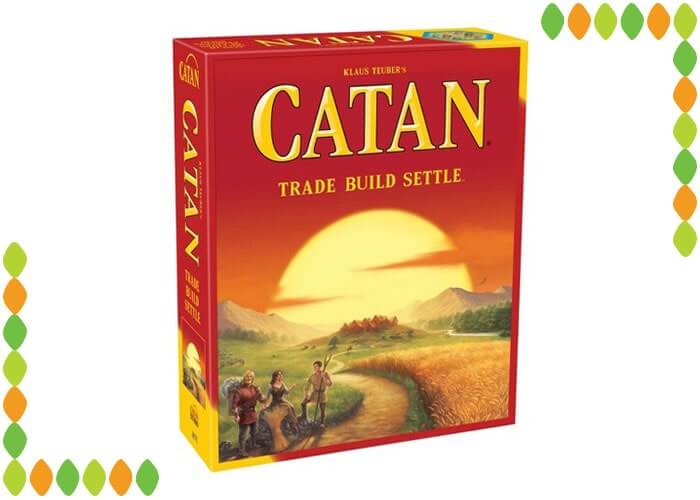
Catan board game, formerly known as Settlers of Catan, is the game that kicked it all off. It was the first major hit in the Eurogame genre and through the years it’s become many players’ favorite title, in addition to having introduced a very large number of new players to the tabletop world. This game still holds up as one of the best Eurogames ever made and it’s usually my first recommendation whenever someone asks for a good strategy game that’s not difficult to grasp.
KOSMOS published the very first edition of Catan all the way back in 1995 and its insanely well received release is probably the reason this article exists. Players finally had a chance at decent human interactions midgame instead of constantly bragging and threatening their opponents and what do you know, they loved it. Catan grew into one of the biggest tabletop titles ever published and it’s only been getting more and more popular by day. Other titles were inspired by it and suddenly the market was taken over by Eurogames.
read more : 6 Best Board Games Published in the ’90s
The game puts 3-6 players (the base game supports up to 4, expansion available for up to 12) in the shoes of discoverers of a new paradise island. They must build their settlements, expand their territory and find a way to form a beneficial dynamic with their neighboring clans in order to make sure their future generations are safe and sound in this island. All clans must live on the island together in harmony, but the winner is the player whose clan is dominant over it or is the strongest civilization by the end of the game. A goal that can only be achieved through careful planning and strategizing your every move and properly managing the resources at hand, all while being on good diplomatic terms with the other villagers living nearby.
You can read all about Catan in this article where we’ve explored the island down to the very last inch.
6. A Feast for Odin
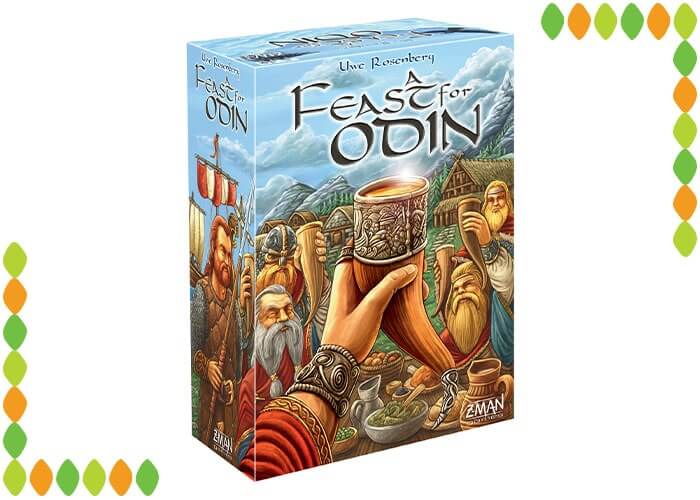
Z-Man’s Feast for Odin, designed by Uwe Rosenberg and published in 2016, is yet another strategy title on our list that features elements of worker placement and resource management. In this game you and up to 4 other players are tasked with bringing your clan of Vikings glory and triumph as well as wealth and resources, to come to be known as the most successful Viking tribe of them all.
As clan leaders, players take turns placing their workers/villagers on action spaces on their personal player board in an attempt to gather resources, capture beasts, build structures, and explore new territories. The final objective of the game is to acquire as many points as you can by the end of the session, which is determined by the number of rounds played.
A Feast for Odin is a complex game of strategical resource management that’s been highly praised for its balanced gameplay and engaging mechanics, as well as being just complex enough for fans of Eurogames all over the globe. Its depth of gameplay and replayability is why I recommend A Feast for Odin to all fans of strategy games, specifically to those with not too much time on their hands. A fun, challenging and yet compact Eurogame experience that’s sure to provide lots of entertainment.
5. Ticket to Ride
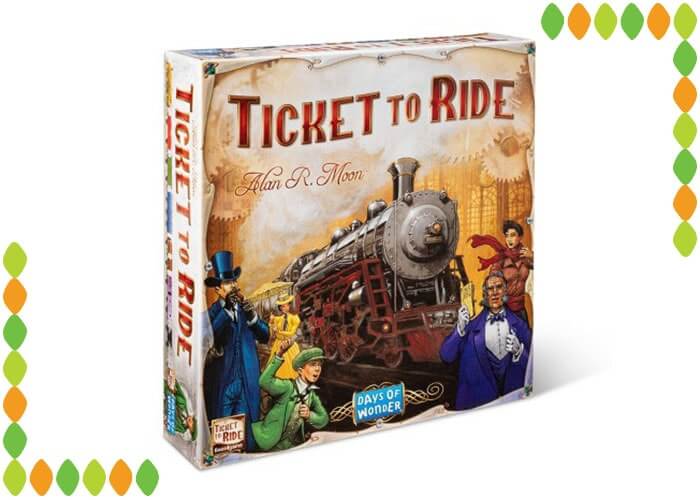
Ticket to Ride is a popular classic designed by Alan R. Moon and published by Days of Wonder in 2004. The game is widely known to the community as a gateway title and the events of it are set in the early 1900s where players take on the role of railway barons, competing to build the most efficient railroad network across a real-life location such as a country or continent that varies depending on the version of the game you choose to play.
Each player owns a set of train cards, which vary in color, as well as destination tickets, which indicate two cities that each baron is tasked with connecting by a continuous route to earn victory points. On each turn, a player can take new train cards, claim a route by playing a set of matching cards, or draw additional destination tickets. Players can earn victory points by establishing and completing their main railroad routes and bonus points are given to those who manage to do more.
Ticket to Ride is mostly known for its simplistic rule set that’s easy to learn and fast-paced gameplay, making it a popular choice for families and casual gamers that can be wrapped up in less than an hour. The game is also supported by numerous expansions and variations, including versions set in Europe, Asia, Africa, and other regions, which gives you tons of variety in terms of personalizing your experience.
4. Terraforming Mars
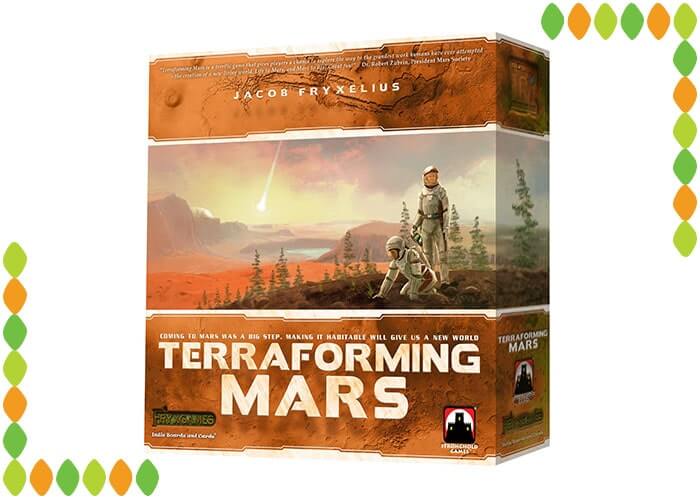
Terraforming Mars is a board game that’s been designed by Jacob Fryxelius and published under his own company’s license, FryxGames, in 2016. The game is pretty popular among board gamers and it’s considered by almost the entire community to be one of the best strategy games out there and it’s won numerous awards to prove it. It takes about 2 hours to play at max and isn’t challenging for new players to learn.
In the game, 1-5 players take helm of massive corporations that are working together to transform the big red into a habitable planet. They must balance their company’s resources and carefully decide which projects they want to invest in that gets them closer to their final objective.
The game offers a lot of complexity and replayability, which means you can play it over and over again without getting bored and its futuristic theme has given the designers some creative freedom with the sci-fi-ish technology and resources that are featured within the game. Its blend of strategy, theme, and replayability make it a popular choice for fans of the genre all across the world.
3. Great Western Trail
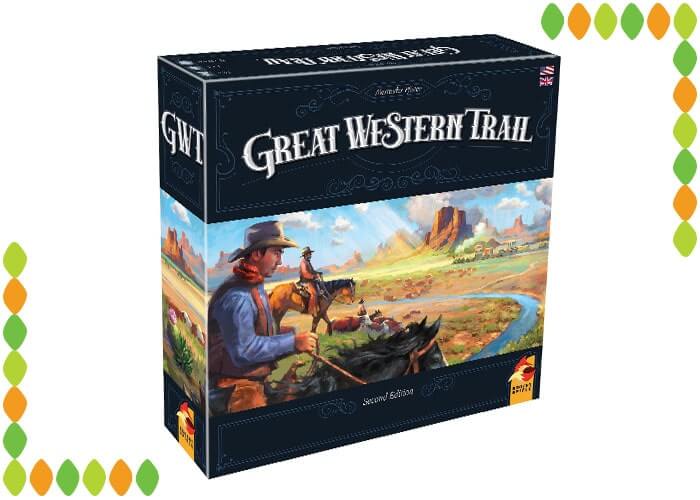
Stronghold games published this title back in 2016 and ever since then, with its unique way of mixing up familiar mechanics such as worker placement, deck building and resource management, it’s gained a lot of well-deserved popularity. The game’s revised and upgraded version was released in 2021, labeled the second edition of Great Western Trail. The original title is designed for 2-4 players but the 2nd edition comes with the option of playing the game solo. It takes about 70-150 minutes to finish and it gives you a chance of playing your dream of running your own ranch.
You and your friends are cowboys in America, 1900s and are trying to make an honest living by doing what your old man and his before him have been doing for ages. You herd a cattle through the great western trail all the way to Kansas City, where the most valuable cattle will earn a handsome reward in cash. It’s up to you to make sure that your cattle reaches Kansas City in its best possible form and there are numerous facilities along the great trail that you can use to your advantage. You can also get a helping hand from the skillful locals whenever necessary.
Great Western Trail is a well-designed and engaging Euro-style title that offers a rich and immersive gameplay experience to fans of the genre. With its deep strategy, unique and interesting theme, challenging gameplay, and high replayability, it is no surprise that it has already become a fan-favorite among board gamers in its relatively short time of being around.
2. Concordia
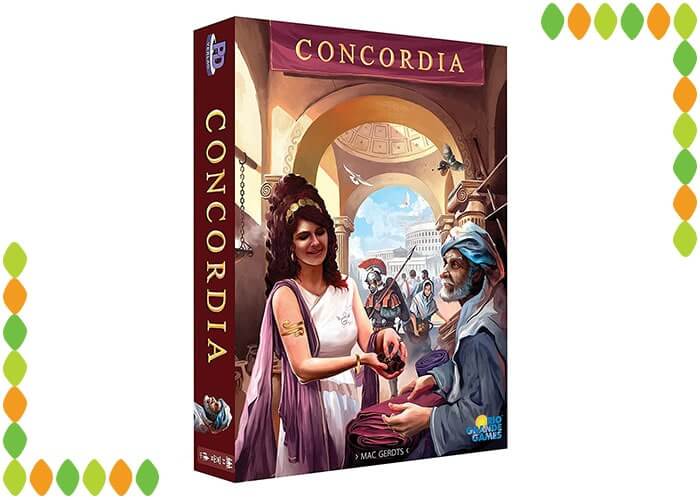
Concordia, published by Rio Grande Games in 2013, is a modern classic that takes us 2000 years back to the reign of the Romans over the Mediterranean seas. The age of cultural, social and of course economic flourishing. The main game takes about 100 minutes to finish and is optimally played by 2-5 players, with both solo and duo expansions available that bring more depth and variety to the game as a whole.
You’ll take on the role of ambitious merchants attempting to establish the widest and most successful trading network across the Mediterranean and further. To help you achieve this ambition, you are allowed to hire skilled crew members, build settlements around the empire and trade with other merchants in a strategic manner. The winner is the player whose network of merchandise reaches at least one of their ultimate goals.
In comparison to other similar and popular titles, Concordia is supposedly the least depending on luck and most on strategy and so, it’s more recommended for more intense gaming sessions or players with higher levels of experience in Eurogames. With that said, the theme is peaceful and the rules aren’t hard to understand, which means the game doesn’t brutally punish newcomers but simply rewards skillful strategies. If economic growth sounds like your cup of tea, you’re absolutely recommended to experience where it all began.
1. Brass: Birmingham
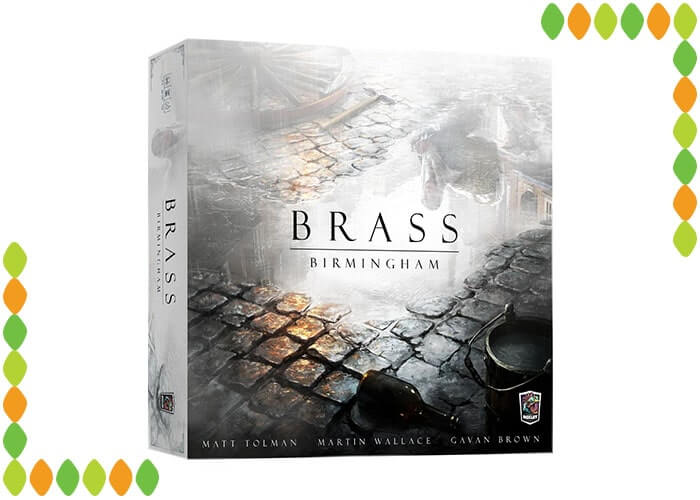
Brass: Birmingham is a strategic economical advancement game that’s set during the Industrial Revolution era in Victorian England and can be played by 2-4 players in 1-2 hours. The goal of the game is to build a business empire by investing in newly-arose industries, building infrastructure, and connecting cities with canals and railways, which will connect your business empire to other territories and businesses.
Players use their coal and iron resources to power steam engines and produce higher-level goods and more efficient factories for more and more income. Timing and market fluctuations are crucial, innovative factors that will significantly affect your decisions and you must strategically upgrade your industrial affairs and machines and infrastructure to earn the highest amount of victory points at the end of the game. The player who manages to do that before anyone else does, is crowned the industrial tycoon of Birmingham.
Brass: Birmingham is an exceptional blend of complexity, strategy, player interaction and resource management. The original Brass game is still considered an untimely masterpiece by the community and the sequels are nothing short of that. I extremely recommend this title to anyone who enjoys strategic thematic board games and not to scare new players off, but it’s a lot more enjoyable a few playthroughs in.
Final Thoughts
Eurogames or Euro-style board games have taken the world of tabletop entertainment by storm and for good reason. I can’t say everyone should enjoy these games, but I already know that the majority of gamers do. They offer a relaxing chance to stretch out your brain muscles a little bit as well as provide a friendly environment for you and your friends to get around the table and exchange knowledge or humor while casually building something up that’s both fun to do and proper for bragging about.
If you’ve grown tired of the big role that the element of chance plays in your games or if you are simply bored with big battles and combat, Eurogames is the genre you should head towards. There are more than enough terrific titles under this category to keep the analytical, strategic parts of your brain busy and happy for casual sessions that are often not very time-consuming.
Do you love or hate Eurogames? What are your favorite titles in the genre and why? Share all your comments with us down below!

